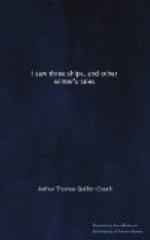Therefore, I was startled when, as the landlord threw open the door and stood aside to let me pass, it came upon me again—and this time not as a merely vague sensation, but as a sharp and sudden fear taking me like a cold hand by the throat. I shivered as I crossed the threshold and began to look about me. The landlord observed it, and said—
“It’s chilly weather for travelling, to be sure. Maybe you’d be better down-stairs in the coffee-room, after all.”
I felt that this was probable enough. But it seemed a pity to have put him to the pains of lighting this fire for nothing. So I promised him I should be comfortable enough.
He appeared to be relieved, and asked me what I would drink with my dinner. “There’s beer—I brew it myself; and sherry—”
I said I would try his beer.
“And a bottle of sound port to follow?”
Port upon home-brewed beer! But I had dared it often enough in my Oxford days, and a long evening lay before me, with a snug armchair, and a fire fit to roast a sheep. I assented.
He withdrew to fetch up the meal, and I looked about me with curiosity. The room was a long one—perhaps fifty feet from end to end, and not less than ten paces broad. It was wainscotted to the height of four feet from the ground, probably with oak, but the wood had been so larded with dark blue paint that its texture could not be discovered. Above this wainscot the walls were covered with a fascinating paper. The background of this was a greenish-blue, and upon it a party of red-coated riders in three-cornered hats blew large horns while they hunted a stag. This pattern, striking enough in itself, became immeasurably more so when repeated a dozen times; for the stag of one hunt chased the riders of the next, and the riders chased the hounds, and so on in an unbroken procession right round the room. The window at the bottom of the room stood high in the wall, with short blue curtains and a blue-cushioned seat beneath. In the corner to the right of it stood a tall clock, and by the clock an old spinet, decorated with two plated cruets, a toy cottage constructed of shells and gum, and an ormolu clock under glass—the sort of ornament that an Agricultural Society presents to the tenant of the best-cultivated farm within thirty miles of somewhere or other. The floor was un-carpeted save for one small oasis opposite the fire. Here stood my table, cleanly spread, with two plated candlesticks, each holding three candles. Along the wainscot extended a regiment of dark, leather-cushioned chairs, so straight in the back that they seemed to be standing at attention. There was but one easy-chair in the room, and this was drawn close to the fire. I turned towards it.
As I sat down I caught sight of my reflection in the mirror above the fireplace. It was an unflattering glass, with a wave across the surface that divided my face into two ill-fitting halves, and a film upon it, due, I suppose, to the smoke of the wood-fire below. But the setting of this mirror and the fireplace itself were by far the most noteworthy objects in the whole room. I set myself idly to examine them.




